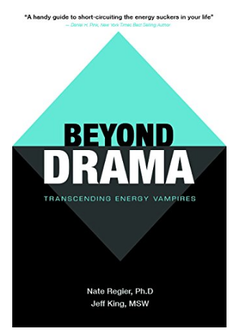|
I'm excited to share this book review from one of our own FUN Followers on, Beyond Drama: Transcending Energy Vampires. (Some of you might recognize the term 'Energy Vampire' from the book, The Energy Bus: 10 Rules to Fuel Your Life, Work, and Team with Positive Energy by Jon Gordon - another interesting book related to group interaction). Floyd Hinman and I have been having some wonderful conversations (via email) about all sort of adventure education related topics lately. One of them was connected to this book. So, I asked him if he would share his thoughts, at some point, about the book in a way that might show us how the content could help us grow as team building facilitators. Shortly after my request he sent his thoughts. Thank you Floyd! Truly appreciated.
|
With the goal to "help you understand the drama that may be playing out in your own work or home life and how to transform it into conscious, compassionate, collaboration," the authors, Nate Reiger and Jeff King introduce us to the "Drama Triangle." These two Next-Element co-founders point out that because of drama, relationships are strained, trust is absent, creativity is stifled, and costly turn over rates [in business settings] are present and rising.
In the persecutor role, an individual falls into blaming, manipulating, controlling, and judgmental behaviors. Their myths are "I'm okay, you're not okay," and "I can make you feel bad emotionally."
The behaviors in the Victim role are withdrawing, being needy, and complaining without doing anything. They believe, "you can make me feel good emotionally," and "you can make me feel bad emotionally."
On the Rescuer side of the triangle we find unsolicited advice, meddling, and people who do the jobs of others. Their myth is, "I can make you feel good emotionally."
In the compassion Triangle, the three roles of the Drama Triangle are invited to take on new roles that drive the community towards growth. Here the alternative of the victim is "Openness," and is characterized by "transparency, honesty, assertiveness, and the willingness to risk trusting another person." The Open person knows "my OK-ness is not dependent on another's response."
Persistence becomes the alternative for the persecutor. They work to "preserve the dignity and respect of all parties," and are characterized by "the willingness to stick with someone or something rather than attack, abandon, or blame."
Resourcefulness takes the place of the rescuer and is characterized by the use of problem solving and empowering others.
In the drama triangle communities and individuals often find themselves in tunnel vision rather than seeing other perspectives, looking for justification rather than finding ways of being effective, and being delusional rather than being in touch with reality.
As a basic example, Nate tells the story of his son who decides he wants to play basketball. Nate, being motivated by conviction felt that the way to motivate his son was to practice every day and shoot certain amounts of shots from different places on the floor, and to run drills. His son, on the other hand was driven by contact. He wanted to play a sport to have fun and to interact with his peers in a sporting environment. When Nate began trying to motivate his son, the son started losing interest because it was no longer meeting his needs, but rather Nate's expectations. When Nate begins just playing basketball with his son, his sons motivation returns. In the Drama Triangle, the relationship between the two became strained, but when Nate was able to step into the compassion triangle, he was able to see the situation from a different perspective and work with his son to develop interactions that worked for them both.
I hope Floyd's brief synopsis of Beyond Drama inspires some of you to pick up the book and dive in. For me it's information I can use and share with groups whose members might be showing the behaviors involved in the Drama Triangle. Of course, it will depend on the type of program you are leading, so use your new-found information with care.
All the best,
Chris Cavert, Ed.D.







 RSS Feed
RSS Feed